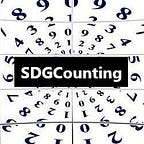This Week in #SDGs Counting: The 2017 Development Co-Operation Report
The latest from OECD focuses on Data for Development.
Earlier this week, The Organisation for Economic Co-Operation and Development released Development Co-Operation Report 2017: Data for Development. The report begins with looking at the data gaps present in the Sustainable Development Goals, to provide a current overview of development data and recommendations for “making data work for development”. Part 2 of the Report includes profiles of development finance and policy trends for OECD member countries.
Part 1 of the Report offers six data actions that development partners, civil society, and the private sector can take to support national statistical systems in bridging the data divide.
- Make statistical laws, regulations and standards fit for evolving data needs
- Improve the quantity and quality of financing for data
- Boost data literacy and modernize statistical capacity building
- Increase efficiency and impact of investment in data and capacity building through coordinated country-led approaches.
- Invest in and use country-led results data to monitor progress made toward the SDGs
- Make data on development finance more comprehensive and transparent.
Part 1 of the report is divided into chapters that reflect these six data actions, and include ‘In My View’ segments where data and development experts share insights into experiences and research conducted on various data subjects.
Chapter 1: Overview: What will it take for data to enable development?
- ‘In My View’ by Martine Durand, OECD Chief Statistician and Director of the OECD Statistics Directorate: Improving sustainable development data is a task for all
Chapter 2: The value of data for development
- ‘In My View’ by Morten Jerven, Professor at the Norwegian University of Life Sciences: We need to rebalance the political economy of statistics
Chapter 3: The role of national statistical systems in the data revolution
- ‘In My View’ by Stefan Schweinfest, Director of the United Nations Statistics Division: We need a global data architecture for sustainable development
Chapter 4: Rethinking donor support for statistical capacity building
- ‘In My View’ by Sarah Hendriks, Director of Gender Equality at the Bill and Melinda Gates Foundation: Closing the gender gap requires closing the data gap
Chapter 5: Making better use of results data in development co-operation
- ‘In My View’ by Ellen Catherine Kiosterud, of the Division for Development Co-Operation, Statistics Norway: International development partners face the challenge of good practice
Chapter 6: Getting development finance data right
- ‘In My View’ by Lisa Grace S. Bersales, Vice Minister and National Statistician and Civil Registrar General, Philippines: Strong Data partnerships are needed to ensure the right data for development
Open Data Watch published a blog summarizing these six data actions from the report, as well as bringing insights from the latest Partner Report on Support for Statistics (PRESS 2017). Both reports were released this month, and provide data on financial investment in data and statistics.
Next month, the Inter-Agency and Expert Group on Sustainable Development Goal Indicators (IAEG-SDGs) will meet in Bahrain to discuss next steps for the SDG indicators. The Development Co-Operation Report 2017: Data for Development points out that no data is available for two-thirds of the 232 unique SDG Indicators, and 88 indicators have no agreed methodology as well as no data available. This is reflected in the Tier System for SDG indicator classification: 82 Tier I indicators with established methodology and available data; 61 Tier II indicators with established methodology but no available data; and 84 Tier III indicators, for which neither methodology or data currently exist; as well as 5 indicators with different components of the indicator classified into multiple tiers.
This 6th meeting of the IAEG-SDGs will take place from November 11th to the 14th, 2017, and current meeting objectives include:
- Reviewing the Tier classification
- Discussing proposed guidelines on data flows and global data reporting
- Reviewing progress made on the methodological development of the 84 Tier III indicators
- Discussion of issues related to the work stream on data disaggregation
- Discussion of progress made on the data reporting calendar
We look forward to seeing how this upcoming meeting, and this new publication from the OECD, can push forward the SDG indicators to leave no one behind.
